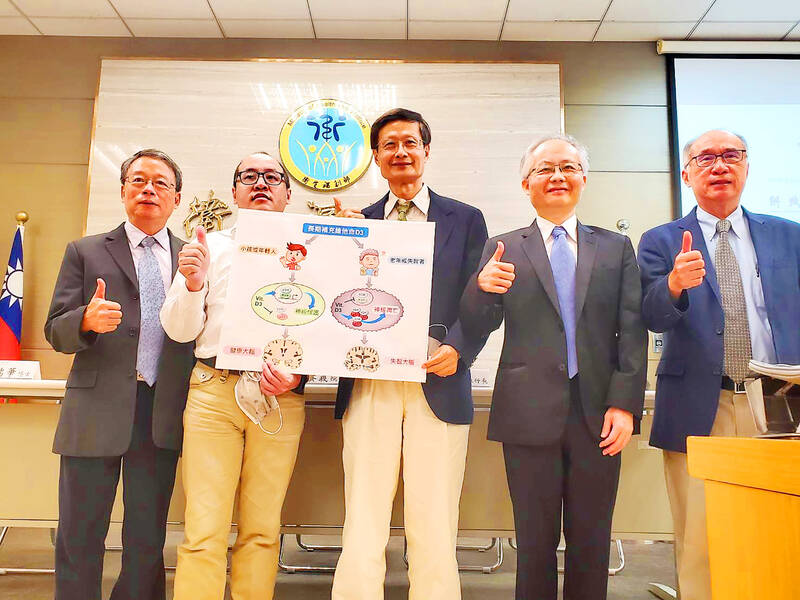Elderly people who take vitamin D supplements long-term and regularly have 1.8 times the risk of developing Alzheimer’s disease or other forms of dementia compared with those who do not, National Health Research Institutes (NHRI) scientists said yesterday.
The Ministry of Health and Welfare said that 7.78 percent of Taiwanese aged 65 or older have some form of dementia.
Vitamin D plays a role in maintaining cognitive function, and many studies have found that vitamin D deficiency correlates with an increased risk of dementia, leading many people to take the vitamin to prevent the disease, NHRI Institute of Molecular and Genomic Medicine researcher Juang Jyh-lyh (莊志立) said.

Photo: Lin Hui-chin, Taipei Times.
However, a study led by Juang and NHRI National Center for Geriatrics and Welfare Research scientist Hsu Chih-cheng (許志成), using the National Health Insurance database, found that elderly people who took a 0.25mg vitamin D3 supplement 146 days or more each year had 1.8 times the risk of developing dementia compared with those who did not take the supplement.
Additionally, people with dementia who took vitamin D3 had a 2.17 times greater risk of death, he said.
Juang said his research team conducted additional studies that experimented on mice, finding that mice with Alzheimer’s disease that were fed a vitamin D-sufficient diet showed significantly lower levels of serum vitamin D.
When vitamin D was decreased in the mice, the number of the vitamin’s binding receptors in the brain increased in the same plaques considered a trigger for Alzheimer’s disease, he said.
Overall, the study seems to show that vitamin D deficiency might be a result rather than a cause of Alzheimer’s disease, and that vitamin D supplements could hasten brain degeneration in people who have the condition.
However, Juang added that the findings do not suggest that vitamin D supplements have no benefit, as they could be valuable in other areas of health.
Juang said that he would remind people not to over-use vitamin D supplements.
Those who might be vulnerable to dementia should re-evaluate the need for the vitamin and consult a physician before taking the supplement, he said.

A preclearance service to facilitate entry for people traveling to select airports in Japan would be available from Thursday next week to Feb. 25 at Taiwan Taoyuan International Airport, Taoyuan International Airport Corp (TIAC) said on Tuesday. The service was first made available to Taiwanese travelers throughout the winter vacation of 2024 and during the Lunar New Year holiday. In addition to flights to the Japanese cities of Hakodate, Asahikawa, Akita, Sendai, Niigata, Okayama, Takamatsu, Kumamoto and Kagoshima, the service would be available to travelers to Kobe and Oita. The service can be accessed by passengers of 15 flight routes operated by

Alain Robert, known as the "French Spider-Man," praised Alex Honnold as exceptionally well-prepared after the US climber completed a free solo ascent of Taipei 101 yesterday. Robert said Honnold's ascent of the 508m-tall skyscraper in just more than one-and-a-half hours without using safety ropes or equipment was a remarkable achievement. "This is my life," he said in an interview conducted in French, adding that he liked the feeling of being "on the edge of danger." The 63-year-old Frenchman climbed Taipei 101 using ropes in December 2004, taking about four hours to reach the top. On a one-to-10 scale of difficulty, Robert said Taipei 101

MORE FALL: An investigation into one of Xi’s key cronies, part of a broader ‘anti-corruption’ drive, indicates that he might have a deep distrust in the military, an expert said China’s latest military purge underscores systemic risks in its shift from collective leadership to sole rule under Chinese President Xi Jinping (習近平), and could disrupt its chain of command and military capabilities, a national security official said yesterday. If decisionmaking within the Chinese Communist Party has become “irrational” under one-man rule, the Taiwan Strait and the regional situation must be approached with extreme caution, given unforeseen risks, they added. The anonymous official made the remarks as China’s Central Military Commission Vice Chairman Zhang Youxia (張又俠) and Joint Staff Department Chief of Staff Liu Zhenli (劉振立) were reportedly being investigated for suspected “serious

Taiwanese and US defense groups are collaborating to introduce deployable, semi-autonomous manufacturing systems for drones and components in a boost to the nation’s supply chain resilience. Taiwan’s G-Tech Optroelectronics Corp subsidiary GTOC and the US’ Aerkomm Inc on Friday announced an agreement with fellow US-based Firestorm Lab to adopt the latter’s xCell, a technology featuring 3D printers fitted in 6.1m container units. The systems enable aerial platforms and parts to be produced in high volumes from dispersed nodes capable of rapid redeployment, to minimize the risk of enemy strikes and to meet field requirements, they said. Firestorm chief technology officer Ian Muceus said